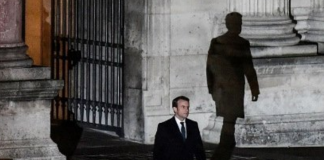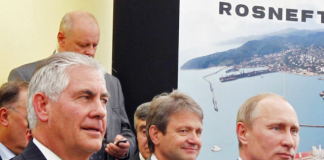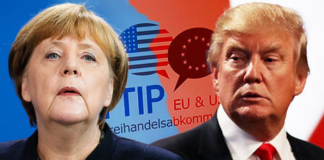EU
From Capital to the Capitol
Paris, by Dimitris Konstantakopoulos
The cameras are set low. They show him slightly taller than he really is as, alone, to the accompaniment of the...
Analyse des programmes économiques de Macron et Le Pen par Les...
Emmanuel Macron, l’économie en marche arrière
Source : Les économistes atterrés, 07-03-2017
Après plusieurs mois de suspense, Emmanuel Macron vient de présenter son programme. Le programme économique...
Macron and Le Pen fight for French working-class vote
France’s presidential candidates battled for the working-class vote in a day of sometimes violent protests ahead of next Sunday’s election.
As May Day workers’ rights...
Tillerson: Never Peace with Russia
Tillerson Vows Forever Sanctions on Russia
By Stephen Lendman
According to acting State Department spokesman Mark Toner, Tillerson spoke to (illegitimate US-installed putschist) Ukraine (puppet)...
(With some help from Daesh) France can choose now between two...
French elections: Euro and shares jump after vote
The euro jumped to a five-month high after the first round of voting in the French presidential...
CLAIM: Trump Plans to Resurrect TTIP, Put EU Before Britain in...
U.S. President Donald Trump is pushing Britain behind the European Union in the queue to strike new trade deal, unnamed sources have told The...
Extremes Droites Europeennes: Islam Notre Ennemi, Israel notre Avenir!
L’année des patriotes européens à Coblence : Israël est notre avenir !
on: janvier 23, 2017
Un jour après l’investiture de Trump, le FN avec Marine...
French Bourgeoisie afraid of Revolution!
Mélenchon’s Rise
Samuel Earle 19 April 2017
Tags: french presidential election 2017 | mélenchon
On 9 April, the left’s late-runner for the French presidency, Jean-Luc Mélenchon, held...
Détruire l’UE, aller à la guerre au Moyen Orient, abolir les...
Par Dimitris Konstantakopoulos (*)
On raconte que Madame Le Pen n’a pas beaucoup de chances d’être elue. Mais il faut raconter exactemenet ça, si on...
The Hijacking of France (from Donald Trump to Marine Le Pen)
By Dimitris Konstantakopoulos (*)
“I am the last President of France. All the next presidents will be accountants,” François Mitterrand once said.
But he would not...









